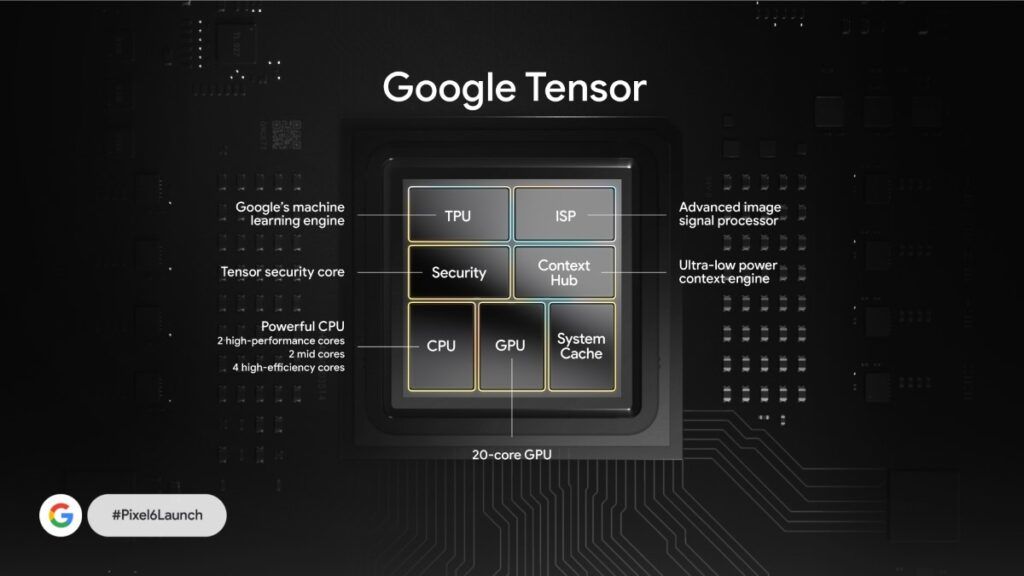Google Tensor confirmed to be based on Exynos by Pixel 6 code
The Google Tensor is manufactured on Samsung’s 5nm process, but it seems the collaboration does run deeper. While previously it was rumored that the Google Tensor chip is based off an Exynos chip, code in the Pixel 6 confirms the link.
Google Tensor is a Samsung Exynos chip?
To people annoying me for calling the Google Tensor an Exynos variant, or keep brining up Samsung into the discussion. pic.twitter.com/t7hRh55CHt
— Andrei F. (@andreif7) October 25, 2021
There are references to the Exynos 9845 (S5E9845) in Google’s code on the Pixel 6, while the Exynos 9840 (S5E9840) is the codename for the Exynos 2100. Google appears to have harnessed some of Samsung’s know-how in designing the chip, but added their own spin to enable the experiences that Google intended to offer with the Google Pixel 6 series.
Unlike the Exynos 2100, the Google Tensor packs two Cortex-X1 cores clocked at up to 2.8GHz for its high-performance cluster, two Cortex-A76 cores at up to 2.25GHz for its “mid” cluster and four efficient Cortex-A55 cores at 1.8GHz. This is actually quite a bit more conservative than the Exynos 2100, which packs one Cortex-X1 at up to 2.91GHz, three Cortex-A78 at 2.81GHz and four Cortex-A55 at 2.2GHz. The GPU has also been bumped up from the Mali-G78MP14 in the Exynos 2100 to a Mali-G78MP20 in the Google Tensor chip.
And then of course there’s the Tensor Processing Unit (TPU) block that gives the Tensor chip its name. Developed by Google’s ML R&D team, the TPU delivers all sorts of AI smarts that Google is debuting with the Google Pixel 6 devices. In combination with the ISP, it also enables advanced computational photography, going so far as to enable 4K60 HDR video recording, while also bringing faster focusing with more accurate face detection.
Google Pixel 6 Series Specs and Price
| Pixel 6 | Pixel 6 Pro | |
| Processor | Google Tensor, Titan M2 security coprocessor 5nm (Samsung) |
|
| RAM | 8GB LPDDR5 | 12GB LPDDR5 |
| Storage | Up to 256GB UFS 3.1 | Up to 512GB UFS 3.1 |
| Display | 6.4″ FHD+ 90Hz OLED display HDR support, 16 million colors, Gorilla Glass Victus |
6.7″ QHD+ 120Hz LTPO OLED display HDR support, 16 million colors, Gorilla Glass Victus |
| Rear Camera | 50MP f/1.85 main camera, 1/1.31″ sensor, OIS 12MP f/2.2 ultra-wide camera, 114° FoV |
50MP f/1.85 main camera, 1/1.31″ sensor, OIS 12MP f/2.2 ultra-wide camera, 114° FoV 48MP f/3.5 4X optical zoom telephoto camera, 1/2″ sensor, OIS, 20X Super Res Zoom |
| Selfie Camera | 8MP f/2.0 | 11.1MP f/2.2 |
| Battery | 4614mAh 30W USB-PD fast charging (sold separately) 21W fast wireless charging (sold separately) |
5003mAh 30W USB-PD fast charging (sold separately) 23W fast wireless charging (sold separately) |
| Price | 128GB: $599 (~RM2499) 256GB: $699 (~RM2916) |
128GB: $899 (~RM3750) 256GB: $999 (~RM4167) 512GB: $1099 (~RM4585) |
From various benchmarks, it appears that the Google Tensor is seen outperforming the Exynos 2100, although it still lags behind the Snapdragon 888 and Apple A15 Bionic chips. Perhaps the upcoming Google Tensor 2 will bring more competitive performance to the table?
Pokdepinion: I do wonder why Google decided on Cortex-A76 cores though, when the Cortex-A78 architecture is more efficient and performant.



























